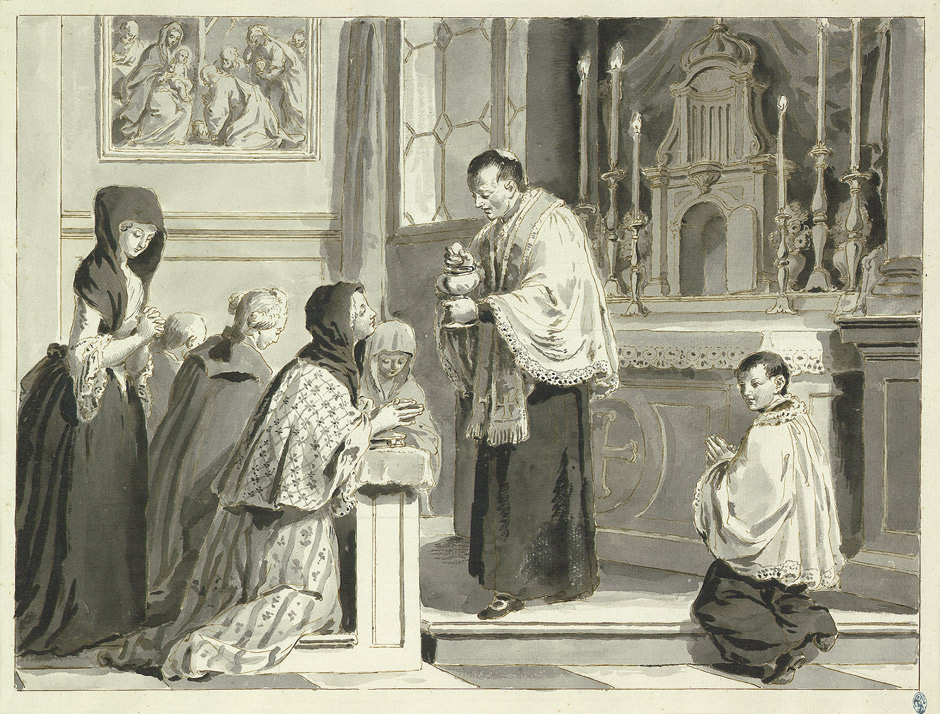Preface: As with some of the previous Catholic Apologetic articles, this article is largely based on the work of Fr. Garrigou-Lagrange in The Three Ages of the Interior Life.
Assistance at Holy Mass
Participation in the Sacrifice of the Mass is one of the greatest means of sanctification and is the highest act of the virtue of religion and of Christian worship. Too often, however, the habit of assisting at Mass degenerates into routine for want of a spirit of faith, and then we no longer receive from the Holy Sacrifice all the fruits that we should.
At Mass, through the double consecration, a sacramental immolation occurs which is a sign of the interior oblation of Christ, to which we should unite ourselves. The oblation is at the heart of the Mass and has infinite value, which it draws from Christ, Who is both priest and victim. When Christ was on earth, this oblation was meritorious; now it continues without the modality of merit. It continues under the form of reparatory adoration and of supplication in order to apply to us the past merits of the Cross.
The Effects on Us from the Mass
The effects of the Mass which relate immediately to God, such as reparatory adoration and thanksgiving, are always infallibly and wholly produced with their infinite value so long as the Mass is valid. The effects of the Mass which relate to us are poured forth on us only in the measure of our interior dispositions.
The Sacrifice of the Mass, as a sacrifice of satisfaction, also infallibly remits to repentant sinners at least a part of the temporal punishment due to sin in proportion to our dispositions. As an act of supplication, the Mass obtains for us ex opere operato all the graces we need for our sanctification. Provided a person prays – be it piously saying the Rosary, following the Missal, meditating on mysteries of the Faith, silent personal conversation with God, or any of the other infinite ways of praying – then one assists fruitfully at Mass.
Holy Communion
The soul tending to Christian perfection ought to live more and more by the Eucharist, not only by assistance at Mass, but by frequent and even daily Communion (that is, given that the soul is in the state of grace). The reception of the Eucharist is called Communion since it is the intimate union of the heart of God with the heart of man. Holy Communion frees us from venial sins, restores to us the fervor which we lost because of these sins, and helps preserve us from mortal sin. Yet, Holy Communion brings us ever new graces, too.
Pope St. Pius X taught that the first and indispensable condition for drawing profit from Communion is an upright and pious intention motivated by supernatural faith and not out of habit. The fruit for our reception of the Eucharist is greater in proportion to the purity, fervor and strength of this pious intention, though it is weakened by secondary intentions (e.g., the desire to be seen and praised for receiving the Eucharist).
The removal of venial sin and imperfections is a negative disposition for more fervent Communions. The positive dispositions for a fervent Communion are humility, a profound respect for the Eucharist, a living faith, and an ardent desire to receive Our Lord. Those who have lost the spiritual hunger for the Eucharist should make daily sacrifices to God, particularly in giving up our own will in our daily actions.
Holy Communion with Our Lady
We can’t sufficiently recommend receiving Holy Communion according to the method taught by St. Louis de Montfort in his True Devotion to Mary. We know that no human being has ever been loved more by God or loved God more than the Blessed Virgin Mary. Her Immaculate Heart is so perfectly united to Her Son’s Sacred Heart, that St. John Eudes speaks of Them as One Heart. Saint Louis recommends that for the greatest spiritual profit we receive Holy Communion through, with and in the Heart of Mary.
Essentially, a person consecrates himself to Our Lady. Then before Communion, he invites Our Lady into his heart, gives himself to Her again, and begs Her to be the one who receives Christ. He asks the Father, Son and Holy Ghost not to look upon him, so unworthy, but instead to look upon the Immaculate Mother and Virgin. The person’s heart and soul then become the “place” in which the Son comes again to His Mother and Our Lady again receives Her Son. Son and Mother love one another and communicate within the one consecrated to Our Lady.
Naturally this method – so focused on the Immaculate Heart of Mary – falls in perfect line with the Message of Fatima. Central to Fatima is the truth that God will save the world through devotion to Mary’s Immaculate Heart. We must each offer much prayer and penance in reparation for the sins committed against Our Lady’s Immaculate Heart. What better way to offer such reparation than through fervent Holy Communions where we intentionally facilitate the love of Jesus and Mary!
Editor’s Note: Receiving Holy Communion in union with the Immaculate Heart of Mary brings so many graces that The Fatima Center has printed a prayer card to help people foster this devotion. This prayer card will be included in our Christmas Greeting mailing, which we hope you receive before December 25th.
Tomorrow we will address “How to Better Prepare Our Souls to Receive God’s Graces in Prayer.”




